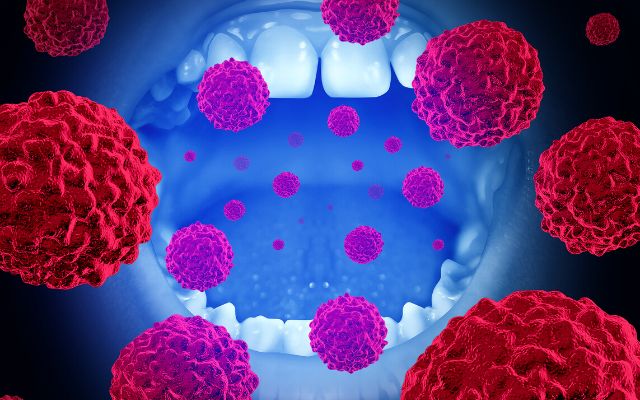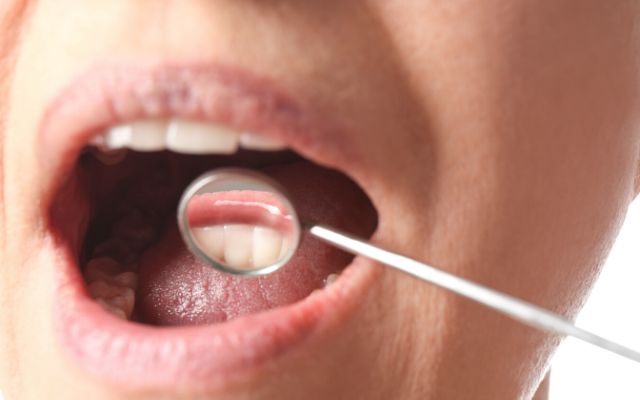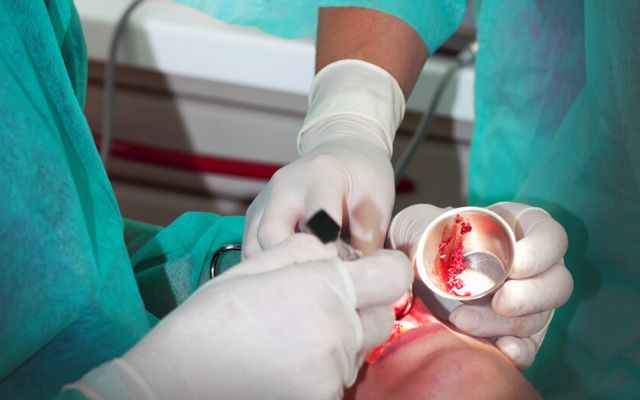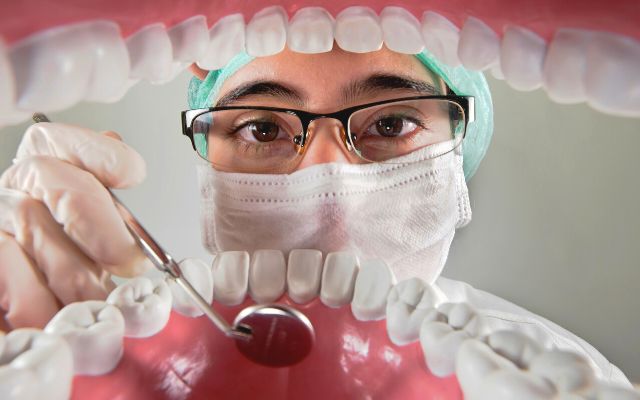How do you know if you have oral cancer? Oral Cancer is cancer that arises in the oral or pharyngeal tissues and belongs to the larger category of head and neck malignancies. In this article, Spring Orchid Dental will explain the causes, signals prevention as well as treatment that you should know.
Let’s get started!
What is Oral Cancer?

Oral Cancer Types
- Buccal Mucosa Cancer (Inner Cheek Cancer)
- Hard Palate Cancer
- Lips, Tongue Cancer
- Floor of Mouth Cancer
- Gum Cancer
Effects of mouth cancer
Cancer that originates in any component of the mouth is referred to as oral cancer (oral cavity). Cancer of the mouth or mouth tumor can affect:
- Lips
- Gums
- Tongue
- The cheeks’ inner lining
- Maxillary ridge
- Floor of the mouth (under the tongue)
- Neck
Oral cancer or oral cavity cancer refers to cancer that affects the mouth’s inner lining. Mouth cancer is one of several kinds of cancer that fall under the category of head and neck malignancies. Typically, mouth cancer and other malignancies of the head and neck are treated similarly.
Signs of Mouth Cancer
The most prevalent symptoms of mouth cancer include:
- Undiagnosed bleeding from the mouth
- Inexplicable numbness, lack of feeling, or pain/tenderness in any facial, oral, or cervical region
- Face, neck, or mouth ulcers that bleed freely and do not heal within two weeks.
- A pain or sensation in the back of the throat, as though something is stuck there.
- Problems in chewing or swallowing, speaking, or moving the jaw or tongue
- Hoarseness, chronic sore throat, or a change in voice are symptoms of laryngitis.
- Earache
- Jaw swelling or discomfort. If you wear dentures, they may be painful and difficult to insert.
- A modification to the fit of your teeth or dentures
- Significant weight reduction
Contact your dentist or health care provider immediately if you observe any of the above changes.
Causes of Oral Cancer

Cancers of the mouth originate when cells on the lips or in the mouth acquire DNA alterations. The DNA of a cell includes the instructions that tell it what to do. The mutational modifications instruct the cells to continue dividing and developing when they would normally perish.
As aberrant mouth cancer cells accumulate, they can form a tumor. They may spread from the lips to other sections of the head and neck or other parts of the body over time.
Cancers of the mouth typically develop in the squamous cells that border your lips and the inside of your mouth. Most oral malignancies are squamous cell carcinomas.
It is unclear what causes squamous cell mutations that lead to mouth cancer. However, doctors have found potential risk factors for oral cancer.
Oral Cancer Risk factors
The following variables can increase your risk of oral cancer:
- Any form of tobacco usage, including cigarettes, cigars, pipes, chewing tobacco, and snuff.
- Heavy alcohol consumption
- Excessive sun exposure to your lips
- HPV
- A compromised immune system
The Oral Cancer Stages

Oral cancer has four distinct phases.
Stage 1: The tumor is less than 2 centimeters (cm) in diameter and has not migrated to the lymph nodes.
Stage 2: The tumor is between 2 and 4 centimeters in diameter, and cancer cells have not migrated to the lymph nodes.
Stage 3: The tumor is either larger than 4 cm and has not spread to the lymph nodes, or it is any size and has spread to a single lymph node but not to other regions of the body.
Stage 4: The tumors are of any size, and the cancer cells have spread to adjacent tissues, lymph nodes, and other organs.
According to the National Cancer Institute, oral cavity and pharynx malignancies have the following five-year survival rates:
- 83%, for localized (non-metastatic) cancer.
- 64% for cancer that has progressed to lymph nodes adjacent
- 38% for cancer that has spread to other organs.
- Overall, 60%
The majority of patients with oral cancer will live for at least five years. The earlier the stage of diagnosis, the greater the likelihood of post-treatment survival. In reality, the total five-year survival rate for patients with stage 1 and stage 2 oral malignancies is normally between 70 and 90 percent. This makes prompt diagnosis and treatment even more crucial.
Who is Affected by Oral Cancer?
According to the American Cancer Society, cancer research shows that men are twice as likely as women to acquire oral cancer. Men over the age of 50 are at the greatest danger. It is estimated that over 50,000 Americans were diagnosed with oral cancer in 2019.
Among the risk factors for developing mouth cancer are:
- Smoking
- Use of smokeless tobacco
- Alcohol consumption in excess
- Cancer history in the family
- Overexposure to light, especially at an early age.
- Certain HPV strains contribute to the etiology of Oropharyngeal Squamous Cell Carcinoma (OSCC)
- Age
- Gender
- Poor diet
Mouth Cancer Treatment
The treatment options for oral cancer depend on the kind, location, and stage of the disease at the time of diagnosis.
Surgery

Surgical removal of the tumor and malignant lymph nodes is commonly used to treat early-stage cancer. Additionally, additional tissue surrounding the lips and neck may be removed.
Radiation treatment
Radiation therapy is an additional choice. Radiation beams are directed toward the tumor once or twice per day, five days per week, for two to eight weeks. Typically, chemotherapy and radiation therapy are utilized to treat advanced stages of cancer.
Chemotherapy
Chemotherapy is a treatment consisting of cancer-killing medicines. The medication is either orally or through an intravenous (IV) line. Although the majority of patients get chemotherapy as outpatients, some require hospitalization.
Targeted treatment
Targeted therapy is an additional treatment option. It is helpful for both early and advanced cancer stages. Targeted treatment medications inhibit the growth of cancer cells by binding to specific proteins on cancer cells.
Nutrition
Nutrition is also an integral aspect of the treatment for oral cancer. Many therapies make eating and swallowing difficult or uncomfortable, and appetite loss and weight loss are typical. Ensure that you discuss your diet with your physician.
A nutritionist can assist you in planning a diet that is soft on your mouth and throat and provides your body with the calories, vitamins, and minerals it needs to recuperate.
Maintaining oral health
Maintaining oral health throughout cancer treatment is a vital component of treatment. Ensure that your mouth is moist and that your teeth and gums are clean.
Oral Cancer Prevention

There is no known method for preventing oral cancer. You can nonetheless minimize your risk of mouth cancer by:
- Stop smoking or do not start. If you smoke, you should quit. If you do not smoke, do not start. Tobacco use, whether smoked or chewed, exposes oral cells to harmful cancer-causing substances.
- If at all, drink alcohol in moderation. Chronic excessive alcohol consumption can irritate oral cells, making them susceptible to mouth cancer. If you choose to use alcohol, do so responsibly. This means up to one drink per day for women of all ages and men older than 65, and up to two drinks per day for men younger than 65.
- Avoid extensive sun exposure to your lips. When possible, protect the skin of your lips from the sun by keeping in the shade. Utilize a hat with a wide brim to effectively shield your complete face, including your mouth. Apply a lip sunscreen as part of your daily sun protection practice.
- Visit your dentist routinely. As part of a standard dental examination, request that your dentist examine the entirety of your mouth for atypical regions that may suggest oral cancer or precancerous alterations.
Contact Our Dentist
Oral cancer is treatable if found early. For this reason, it’s recommended that you schedule biannual visits to the dentist and do a self-exam once a month. Quitting smoking is one of the best strategies to prevent oral cancer.
Please contact our dentists if you feel any symptoms of mouth cancer. Early detection and treatment will help you avoid unwanted discomfort when the disease worsens.
FAQs
What is the Prognosis For those with Oral Cancer?
The overall 5-year survival percentage for people diagnosed with oral cavity and pharynx malignancies at an early stage is 84%. The 5-year survival rate is reduced to 65% if the disease has spread to surrounding tissues, organs, or lymph nodes.
What Measures Can You Take to Prevent Oral Cancer?
Scientists believe that oral cancer begins when the DNA in the mouth’s cells is damaged. But certain factors, such as your health behaviors, can increase your risk of developing the disease. To stop oral cancer:
- Do not smoke or use tobacco and consume alcohol in moderation (and refrain from binge drinking).
- Consume a balanced diet.
- Limit your time spent in the sun. Repeated exposure raises the risk of developing lip cancer, particularly on the lower lip.
- Use UV-A/B-blocking sun protection products on your skin and lips when in the sun.





